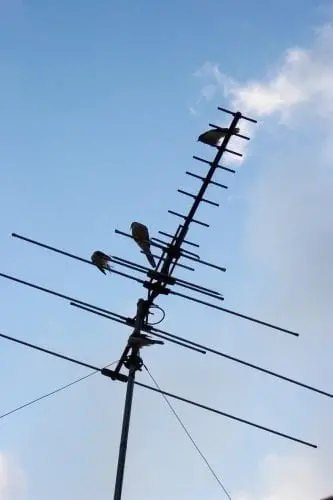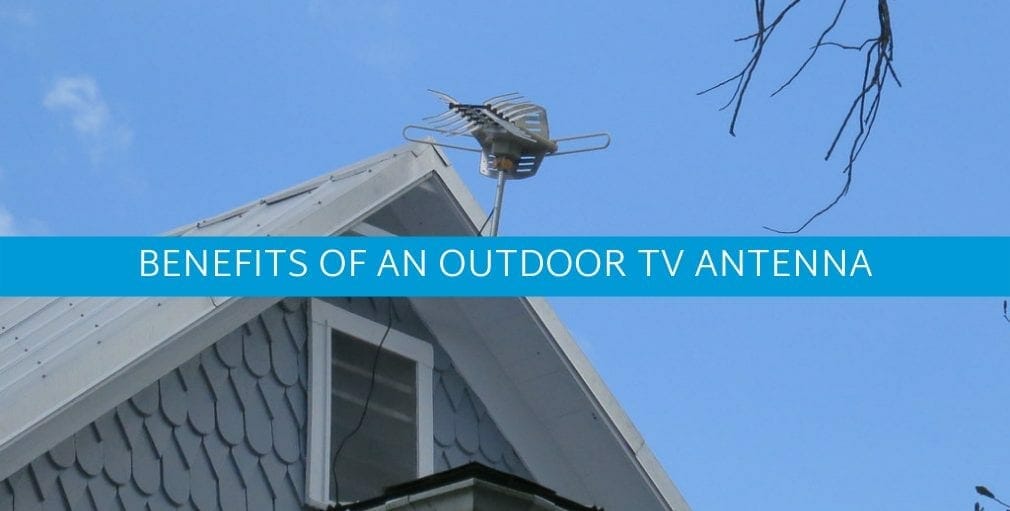It doesn’t matter where you live or how often you watch TV; chances are you’re relying on a subscription service for your TV needs. But even though many people think they’re “old and useless,” outdoor TV antennas can still do quite a bit. They’re a fairly useful thing nowadays, and for some people, they may be the ideal solution.
Before we discuss why you may want one, let’s get one thing out of the way. An outdoor TV antenna isn’t for everyone. There are certain situations where it won’t do much if anything at all.

We’ll cover the following benefits in detail:
- Cost savings: An outdoor TV antenna allows you to access local TV channels for free, saving you money on monthly cable or satellite TV bills.
- High-quality reception: Outdoor TV antennas are typically more powerful and capable of picking up a stronger signal than indoor antennas, resulting in a higher-quality picture and fewer interruptions.
- More channels: An outdoor TV antenna can pick up a wider range of channels than an indoor antenna, giving you access to a greater selection of programming.
- Long-range reception: Outdoor TV antennas are designed to pick up signals from farther distances, making them ideal for rural areas where cable or satellite service is unavailable.
- Easy installation: Outdoor TV antennas are typically easy to install and do not require special tools or expertise.
- Durability: Outdoor TV antennas are designed to withstand harsh weather conditions and are generally more durable than indoor antennas.
- Energy efficiency: An outdoor TV antenna does not require any electricity to operate, which can save energy and reduce your carbon footprint.
- No Reliance On Wifi – If the internet goes out or something happens to your wifi provider, you are set up to have service with no issues still.
How Do Outdoor TV Antennas Work?
An outdoor TV antenna, just like all other antenna types, is a transducer. It’s a device that converts electromagnetic waves into electricity and vice versa. This is why an antenna can be used both as a receiver and transmitter. An outdoor TV antenna, though, usually only receives waves.
With a signal emitted from a transmitter or a satellite, the signal’s waves will induce an electrical current inside the antenna. That current is converted into video and audio, depending on the radio waves’ frequency, and is displayed on your TV set.
An outdoor TV antenna can be used for more than one thing, but the main purpose is to receive TV signals, and that’s what we’ll focus on. You can have a service like TVFool tell you what signals you can receive, for example.

What Benefits Do You Get with An Outdoor TV Antenna?
The main reason you have many people still using an outdoor TV antenna is to save some money. Satellite receivers cost quite a bit to install, and you also have subscription services that cost quite a lot in the long run. Many of us don’t spend too much time in front of our TV, so paying that much for satellite TV or a subscription isn’t worth it. Instead, you usually receive local channels for free with an outdoor TV antenna.
Another big one is that depending on where you live; you may receive a lot of channels. You may find yourself in an area with many broadcast towers around you. Even the omnidirectional antenna can receive signals from most, if not all, and you’ll get a lot of free TVs.
You could potentially solve the weather problem with an outdoor TV antenna. Anyone who’s ever used a satellite subscription knows that bad weather can make watching TV nearly impossible. However, if you have an outdoor TV antenna, that’s not as much of an issue. A good antenna won’t be affected by the weather, so you should be good to go. If you want to be sure, get a high-quality antenna.

Last but not least, we have signal quality, which directly translates into image quality. Any locally transmitted signals are not compressed, which means that you’ll get an image quality that’s significantly better than the compressed signal you would be getting from your cable provider. High-definition channels are where this difference is most obvious, and you will notice the difference immediately.
There are quite a lot of benefits to an outdoor TV antenna. If you get a high-quality model and place it carefully, you’ll be able to enjoy all of them.
Why Not Just Get an Indoor TV Antenna?
Many people suggest you get an indoor TV antenna as a cheaper and simpler solution. However, you’ll need to make many compromises with an indoor TV antenna, and most of them make it a bad choice.
For starters, an outdoor TV antenna has a placement advantage. With the fact that it’s outside, usually on a higher point, you don’t have a lot of interference. With an indoor antenna, you have walls and other objects that will impact the signal – something you want to avoid.

Next, outdoor TV antennas operate at higher frequencies. At an identical range, this means a better signal quality, as well as a better image quality. Also, you’ll get a lot more range than an indoor antenna. If you live far away from a broadcast tower, you may not get any signal with an indoor antenna.
If we’re being honest, we must mention the advantage that an indoor antenna as – it’s much easier to install and set up. All you’ve got to do is plug in a couple of cables, and that’s about it. On the other hand, an outdoor antenna is risky to set up, and you must be careful not to hurt yourself.
Do the Benefits of an Outdoor TV Antenna Make Getting One Worth It?
We were pretty upfront – they aren’t for everyone. If you’re spending a lot of time in front of the TV and watching movies and shows religiously, a subscription may be a better option, even if it costs you more.
On the other hand, if you don’t have good reception where you live or don’t spend that much time in front of the TV, an outdoor TV antenna may be the right choice. Using one is simple enough, and the benefits are obvious. Make sure it’s grounded well, and you’ll be safe and good to go.

